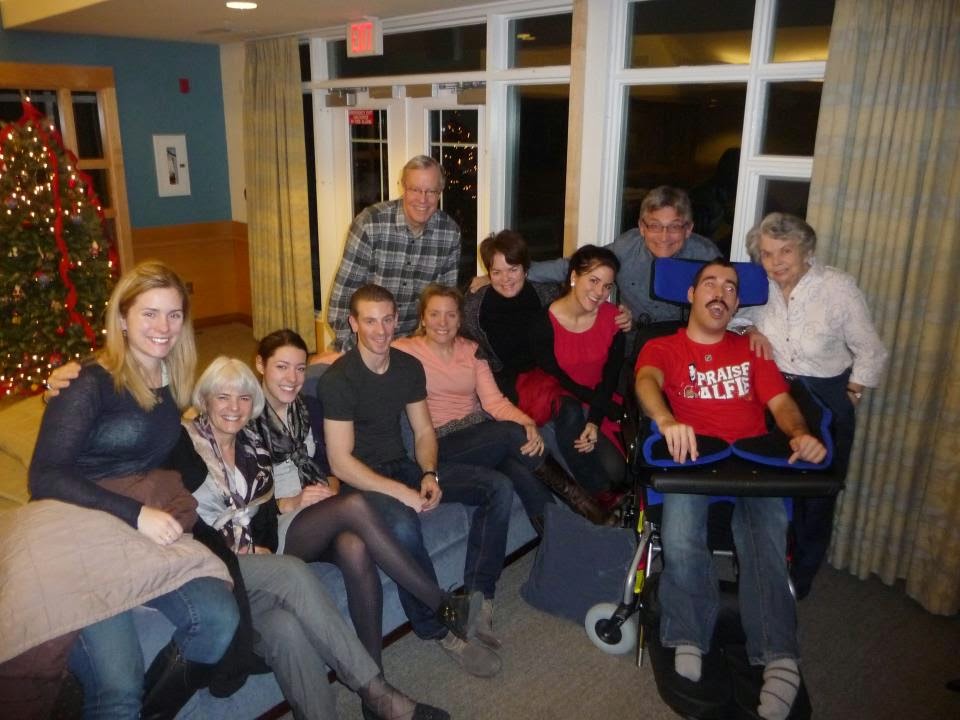Loading the Elevenlabs Text to Speech AudioNative Player...
When my son Nicholas was born with severe disabilities in 1988, my husband and I struggled to care for him on our own. Nick turns 25 at the end of this month and all these years of giving care have taught me one great big lesson.
Caring alone is not a good idea. Caring TOGETHER is a much better way to look after my son and my mother who needs me too. Mom is still feisty, but she is 92 and frail. She needs help with cooking, banking, cleaning, and errands.
Society tells us to ‘look after our own’ and we want to care for those we love best in the world. But caregiving is a job that is full of thousands of small tasks and over time, taken together, the caregiving role can erode physical and mental health. It can make a longtime caregiver feel invisible, sad and constantly inadequate.
I have learned that those in our extended family and our friends WANT to help look after our son and my Mom. They do want to take some small role, but they don’t know how to parse a huge need (as in the case of our son) into a small, reasonable and helpful task that any non-professional could do. Nick had his first major surgery at the age of two and afterwards, he was in desperate straights. My mother-in-law was shocked by the distress in our whole family, but didn’t know how to respond. She said, “If there’s anything I can do, but I’m sure there’s nothing I could do!” Somehow, I found the wherewithal to respond, “Actually, could you maybe make us a banana bread?” She was so relieved and happy to have a task that didn’t involve complicated and overwhelming nursing duties.
Clever innovators in the world of health and long-term care have been working on how to give form and structure to taking sole responsibility for complex care off the shoulders of family members. One such inventor is Dr. Douglas Eby at Southcentral Healthcare Foundation in Anchorage, Alaska. Dr. Eby and his colleagues created the “Nuka” system of care. Dr. Eby describes how Nuka works with a fictional, but typical patient called ‘Frank’. Frank is 87 years old and suffers from diabetes and angina. His daughter lives in another city and visits frequently to help Frank organize his home, medications and medical appointments. Nevertheless, Frank calls 911 frequently and keeps a bag packed for the hospital at the ready.
When the Nuka model of care was created, Dr. Eby changed ‘Frank’s’ primary diagnosis to one of ‘isolation’. On the treatment plan was putting Frank’s daughter in touch with an outreach nurse who would coordinate with Frank and a community center to ensure that Frank filled his prescriptions, took his medications and attended a social group twice a week. A network of family and professionals was formed to care for Frank in a coordinated and respectful way.
We have such a network for our son Nicholas. We don’t live in Alaska, but we are able to emulate the Nuka model using an online tool called Tyze Personal Networks (www.tyze.com). Tyze is a FREE care coordination tool that facilitates seamless communication between professionals involved in Nick’s life with family members and best friends. The unique aspect of Tyze is the data
security – it’s the same as online banking, so it’s accessed only by password and individual sites are not searchable on google. This data security means that medical professionals, including doctors and nursing agencies can work together with family caregivers in a single, online network. Our GP as well as nurses and therapists participate in our son’s Tyze network. Other excellent and free online care coordination tools for friends and family are ‘LotsaHelpingHands’, Caring Bridge and Caring Ties.
security – it’s the same as online banking, so it’s accessed only by password and individual sites are not searchable on google. This data security means that medical professionals, including doctors and nursing agencies can work together with family caregivers in a single, online network. Our GP as well as nurses and therapists participate in our son’s Tyze network. Other excellent and free online care coordination tools for friends and family are ‘LotsaHelpingHands’, Caring Bridge and Caring Ties.
The important message is that sharing the care is a good thing. It is a loving act to ensure we are there for the long term with those we love who need our help. Because rested, happy, healthy caregivers make great caregivers.


